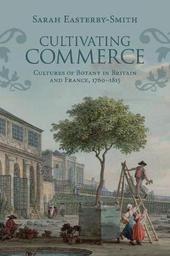
|
Cultivating Commerce: Cultures of Botany in Britain and France, 1760-1815
Paperback / softback
Main Details
| Title |
Cultivating Commerce: Cultures of Botany in Britain and France, 1760-1815
|
| Authors and Contributors |
By (author) Sarah Easterby-Smith
|
| Series | Science in History |
|---|
| Physical Properties |
| Format:Paperback / softback | | Pages:253 | | Dimensions(mm): Height 229,Width 153 |
|
| Category/Genre | History of specific subjects |
|---|
| ISBN/Barcode |
9781107565685
|
| Classifications | Dewey:580.94109033 |
|---|
| Audience | | Professional & Vocational | |
|---|
|
Publishing Details |
| Publisher |
Cambridge University Press
|
| Imprint |
Cambridge University Press
|
| Publication Date |
13 June 2019 |
| Publication Country |
United Kingdom
|
Description
Sarah Easterby-Smith rewrites the histories of botany and horticulture from the perspectives of plant merchants who sold botanical specimens in the decades around 1800. These merchants were not professional botanists, nor were they the social equals of refined amateurs of botany. Nevertheless, they participated in Enlightenment scholarly networks, acting as intermediaries who communicated information and specimens. Thanks to their practical expertise, they also became sources of new knowledge in their own right. Cultivating Commerce argues that these merchants made essential contributions to botanical history, although their relatively humble status means that their contributions have received little sustained attention to date. Exploring how the expert nurseryman emerged as a new social figure in Britain and France, and examining what happened to the elitist, masculine culture of amateur botany when confronted by expanding public participation, Easterby-Smith sheds fresh light on the evolution of transnational Enlightenment networks during the Age of Revolutions.
Author Biography
Sarah Easterby-Smith is Lecturer in Modern History and Director of the Centre for French History and Culture at the University of St Andrews, Scotland. She has a Ph.D. in History from the University of Warwick and has held postdoctoral fellowships at the Institute of Advanced Study, University of Warwick, the European University Institute, Florence and the Henry E. Huntington Library, California. She has served on the Executive Committee of the Social History Society and is also a member of the British Society for Eighteenth-Century Studies, the British Society for the History of Science and the Society for the Study of French History.
Reviews'An impressive comparison between France and Britain which succeeds in restoring horticulture to a central place in the polite practice of natural history. Easterby-Smith's carefully-researched account of the social world of public botany in the decades around 1800 makes a valuable contribution to the field. The book is a model for future research in its attentiveness to paper technologies, social status, gender and taste as sites for constructing the cosmopolitan network of collecting and consuming plants where botanists and gardeners exchanged specimens and knowledge, as well as in its insights into the nursery trade.' E. C. Spary, University of Cambridge 'In this ambitious, wide-ranging and elegantly-written monograph, Sarah Easterby-Smith unlocks the door leading into the unsuspected world of plant traders in England and France in the late Enlightenment and early nineteenth century. Neglected in standard histories of botany, these modest figures established transnational global mercantile connections, stimulated botanical collecting and helped trigger the emergence of a public audience for gardening lore, in so doing refashioning themselves in ways that allowed them to bridge the worlds of commercial culture and polite science. Cultivating Commerce will be warmly welcomed by all scholars of Enlightenment science, culture and commerce - and by gardening enthusiasts everywhere.' Colin Jones, Queen Mary University of London 'Cultivating Commerce very convincingly retraces the protean pathways of knowledge through the logic of the marketplace, while at the same time highlighting how the elite nurseries played out their rivalries within scientific fields that they had contributed to broaden. This work will stand as an essential contribution to the history of science in the public sphere.' Therese Bru, Metascience
|